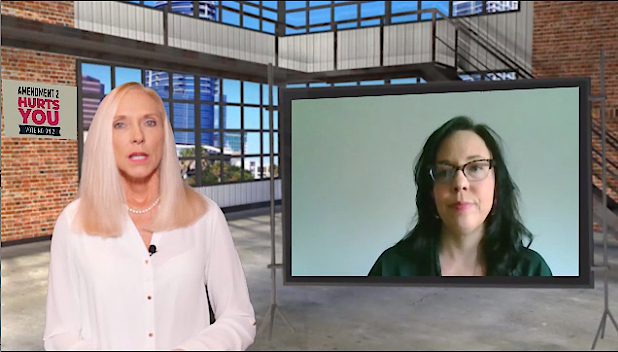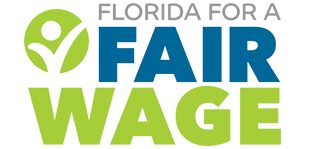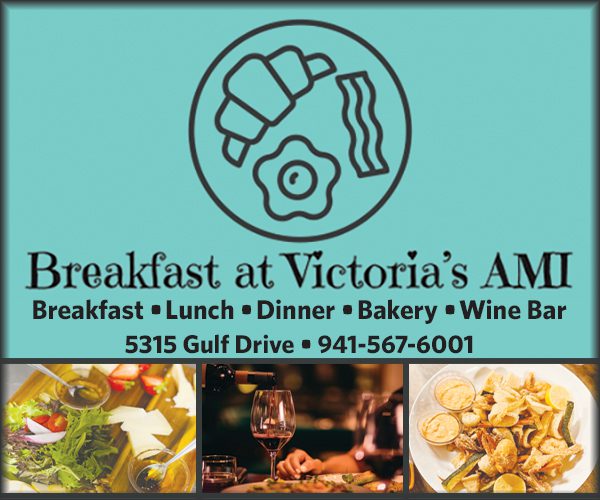MANATEE COUNTY – In November, Florida voters will determine whether the mandatory minimum wage is raised to $10 an hour in 2021 and to $15 in 2026.
Anna Maria Oyster Bar (AMOB) founder and President John Horne opposes the proposed mandatory wage increase and he shared his concerns while serving as a panelist for Thursday’s “Amendment 2 Hurts You” virtual press conference.
“This mandatory wage increase is bad for business. And if it’s bad for my business, it’s bad for my employees,” Horne said.
Initiated by the Florida For a Fair Wage committee chaired by attorney John Morgan, the mandatory minimum wage increase is proposed as an amendment to the Florida Constitution.
If supported by at least 60% of Florida voters, Amendment 2 would raise Florida’s minimum wage to $10 per hour in 2021 and continue to increase $1 per hour each year until it reaches $15 per hour in 2026. After that, the minimum wage would continue to increase according to the annual rate of inflation.
“Florida needs to pass the Fair Wage Amendment to ensure that all hard-working Floridians can receive a living wage. The ‘living wage’ is the minimum cost that covers the basic needs of an individual and the needs of their family without government assistance,” according to the Florida For a Fair Wage website.
“Florida’s minimum wage of $8.56 – or $17,600 per year – for a full-time employee is not a livable wage for many of the 200,000 hard-working Floridians that earn it, especially those working to support a family. As most Floridians know, the cost of living in our state is higher than the national average, particularly when it comes to housing and transportation costs,” the website notes.
Amendment 2 Hurts You
Florida Restaurant and Lodging Association President and CEO Carol Dover hosted the Aug. 20 press conference conducted via Zoom videoconferencing.
Dover said the mandatory wage increase would be a “job-killer” for Florida’s economy and eventually increase the current minimum wage by 77%. She said this would result in lost jobs, lost benefits and the increased use of automated ordering at restaurants.

Dover referenced other cities and states that adopted mandatory minimum wage increases, including San Francisco, Chicago, Seattle and the state of Washington.
“It has destroyed the industries in those states,” Dover said when claiming those wage mandates resulted in many small businesses going out of business.
Dover introduced panelist Simone Barron as someone who’s experienced mandatory wage increases first-hand. Barron said she’s worked in the service industry for nearly 35 years and has worked as a tipped employee in Seattle for the past 18 years. She also co-founded the Seattle-based Full Service Workers Alliance.
In 2014, the Seattle City Council adopted a minimum wage increase that took effect in 2015 at $10 an hour.
According to www.minimum-wage.org, Seattle’s mandatory minimum wage is currently $15.75 an hour for a company with 500 or fewer employees, which is $2.25 higher than the state of Washington’s $13.50 minimum hourly wage. Seattle’s mandatory minimum wage is $13.50 an hour for employees who earn at least $2.25 an hour in tips.
Barron said she originally supported the mandatory wage increases.
“Who wouldn’t want to make $15 an hour, plus tips? We were already making close to $10 an hour, plus tips, and now we were going to get a big raise. I was really for it, but soon after it was implemented we started seeing the negative consequences,” she said.
Barron said customers immediately stopped tipping or tipping well because they assumed servers were already reaping the benefits of the wage increase. She said employers reduced or eliminated the support staffs that include bussers, hosts, food runners and barbacks and the pay model for tipped workers changed.
“My employer got rid of tipping altogether and implemented a 20% service charge, of which I got a small percentage as a commission. Not only was I making less money, I suddenly didn’t have an opportunity to maximize my income. I could only make that small percentage instead of really working a table and going for a large tip,” Barron said.
“After that, we got the loss of hours. Suddenly we weren’t going to work a full shift. The schedule started to shorten,” she added.
Barron said she took a second job and had to work six days a week instead of four to earn what she was accustomed to earning.
“Please take a look at this proposition and really think about how it’s going to impact your job. If I could go back, I wouldn’t have supported it,” she said.
Horne’s concerns
Speaking next, Horne said, “Two-thirds of my employees are tipped employees. They’re earning two to three times more than minimum wage currently. I’ll be cutting hours, I’ll be cutting shifts, I’ll be raising prices. It’s a really vicious spiral.”
Horne noted the wage increase is being proposed when the restaurant industry is already being devastated by the COVID pandemic.
He also worries that increasing prices to offset increased wages could result in retirees and others on fixed incomes eating out less.
“I’m not going to need the number of servers I have now,” Horne said. “I know the large companies can absorb this, but a small business like mine will be crushed. I want to urge all the voters to please vote no on Amendment 2.”
During press inquiries, Horne was asked about the potential impact the mandatory wage increase would have on Anna Maria Island and Bradenton restaurants.
“It’s going to affect every restaurant in Florida,” he said.
Horne has four AMOB restaurants, including one in Bradenton Beach. He said if Amendment 2 passes, the payroll at just one of his restaurants will immediately increase $2,600 per week.
“It’ll go up $138,000 the first year. When we get to $15 an hour, I’ll be paying an additional $600,000 in labor – that’s a lot of price increases to cover labor and that’s just tipped employees. That has nothing to do with my hourly people in the kitchens that are already being paid $13-$17 an hour,” Horne said.
“What about youth labor, the people on their first job? Minimum wage is not head of the household income. Minimum wage is starting wage. I’ve got three or four high school students working my front door. If the minimum wage is $15, am I going to be able to afford $45-$60 an hour to have someone greeting you to the Anna Maria Oyster Bar? Absolutely not,” Horne said.
“It hasn’t been thought out completely. It doesn’t take into consideration what the tipped employees get. It will cut jobs,” Horne said of the proposed amendment.


































